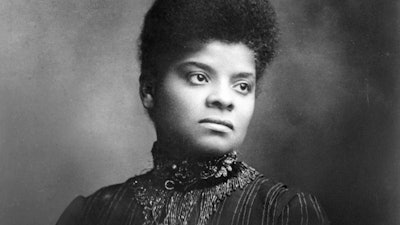 Journalist and NAACP co-founder, Ida B. Wells-Barnett.
Journalist and NAACP co-founder, Ida B. Wells-Barnett.
“Eternal vigilance is the price of liberty.”
Those words come from the pen of Ida B. Wells-Barnett, written in her autobiography, an unfinished work she began one year before her death in 1931. Wells-Barnett was a lifelong fighter for the truth, documenting the racial violence of a post-Reconstruction America by reporting and tracking lynchings. Her contributions to civil rights, equality, and the field of journalism are often forgotten. But Columbia University’s Graduate School of Journalism is working to set it right.
On March 25, Wells-Barnett’s 162nd birthday, a bust of the journalist was unveiled in the school’s main hall, greeting students and guests when they enter. Journalists and scholars, including Nikole Hannah-Jones, creator of The 1619 Project and founder of the Center for Journalism and Democracy at Howard University, and Kimberlé Crenshaw, professor at the University of California Los Angeles School of Law and Columbia Law School, spoke about why Wells-Barnett’s legacy is one that deserves recognition, and how her work and courage must be replicated to confront the troubles of today and tomorrow.
“We tend to think of the U.S. as a nation that’s moving forward and then experiences a period of backlash, when it’s the inverse,” said Hannah-Jones. “[America] is a country that never wanted a multiracial democracy. We’re in a period of massive retrenchment, and not recognizing how dangerous of a period we’re in. Our democracy is on the point of failure.”
Hannah-Jones said this flashpoint exists whether or not Donald Trump is reelected in November, adding that threats against fields of study that dismantle white supremacy, like Critical Race Theory (CRT) and Diversity, Equity, and Inclusion (DEI), have gained significant footholds in society thanks to conservative legislation and a negligent and participatory media.
“American media doesn’t want to feel they are being left out,” said Hannah-Jones. “They’re so afraid of being ‘liberal,’ they don’t tell the truth. If democracy fails, it’s because the fourth estate failed. [A free press] is the firewall of democracy. We don’t have enough people like ourselves trying to write the correct story.”





















